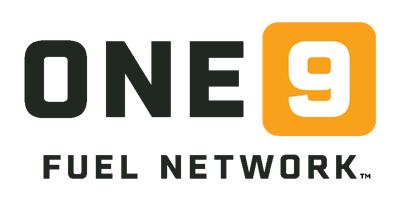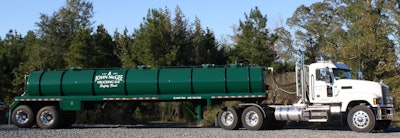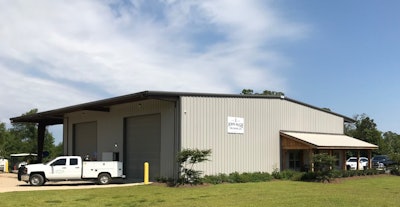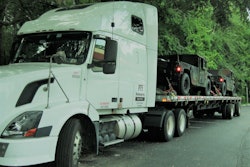 Overdrive this month is profiling nine semi-finalists in the inaugural Small Fleet Champ award program. Three finalists will be announced in early August. The winning small fleet will be unveiled during the Overdrive‘s GATS Week program of events August 24-28 and profiled in greater detail this fall. The Small Fleet Champ program is sponsored by Pilot Company’s One9 Fuel Network, which offers benefits for small fleets.
Overdrive this month is profiling nine semi-finalists in the inaugural Small Fleet Champ award program. Three finalists will be announced in early August. The winning small fleet will be unveiled during the Overdrive‘s GATS Week program of events August 24-28 and profiled in greater detail this fall. The Small Fleet Champ program is sponsored by Pilot Company’s One9 Fuel Network, which offers benefits for small fleets.John McGee of Simsboro, Louisiana, began driving truck in 1985, buying his first one and going into business for himself six years later. He got his start hauling for a brother-in-law’s logging business in the North-Central part of the state, where he’s lived his entire life.
 The Overdrive Small Fleet Champ award is presented by the new One9 Fuel Network, which is geared toward small fleets and owner-operators, offering credit and fuel stop options. One9 is produced by the Pilot Company.
The Overdrive Small Fleet Champ award is presented by the new One9 Fuel Network, which is geared toward small fleets and owner-operators, offering credit and fuel stop options. One9 is produced by the Pilot Company.Then oil field work in his area started picking up around 2004 and he leased to an oil-services hauler. The company sold out in 2010. “When he did that, I acquired some of his customer base the new company didn’t want,” McGee said. He got his authority and has been running John McGee Trucking ever since.
In 2013, McGee was still hauling full time himself and employed two operators. A few years later, he began to add trucks and tankers. The company nearly quadrupled annual revenues to almost $4M between 2016 and the present. McGee cleared a healthy 30% profit in 2019, though he has almost the same amount tied up in financed equipment and a new shop finished the early part of that year. The company now employs 16 full-time drivers.
 John McGee’s equipment-procurement approach utilizes financing for the late-model power units with an autodraft for the payments and cash for the trailers in efforts to minimize debt. The power units are replaced on a five-year cycle.
John McGee’s equipment-procurement approach utilizes financing for the late-model power units with an autodraft for the payments and cash for the trailers in efforts to minimize debt. The power units are replaced on a five-year cycle.Through it all, he’s considered the Golden Rule to be the lynchpin of his success. As he puts it: “Treat all people — employees, customers, vendors — as we wish to be treated.”
Drivers are paid by the hour, with overtime. Schedules are somewhat staggered to serve what can be a 24/7 business.

Counting safety and production bonuses, McGee says, “our top driver probably made $125,000 to $130,000” last year. “We had three, counting him, that hit $100K or above.” The company average is closer to $70,000, he adds, given four 10-hour shifts a week with little to no overtime are common for some.
Drivers at the fleet operate Mack daycabs, pulling mostly tankers with wastewaster from producing wells, doing generally as much site work as they do driving. A typical haul might be around 30 miles or so one-way, and McGee generally keeps drivers within a 125-mile, four-state radius around his home base. “I decided early on in my career to try to be at home every night,” he says, and he’s structured his business to allow the same for his drivers.
 With the finishing touches put on this 7,000-square-foot, two-bay shop in early 2019, John McGee Trucking realized a diversification opportunity when a chicken-feed mill came in across the street. McGee bought his first hopper bottom trailers this year with hopes of securing a stable grain contract with one of the mill’s suppliers.
With the finishing touches put on this 7,000-square-foot, two-bay shop in early 2019, John McGee Trucking realized a diversification opportunity when a chicken-feed mill came in across the street. McGee bought his first hopper bottom trailers this year with hopes of securing a stable grain contract with one of the mill’s suppliers.The pre- and mid-pandemic downswing in oil prices on the world market didn’t impact his “midstream” oil production customers like it did the “completion” side, where products are refined. Not yet, anyway, though he well knows oil field work largely depends on world markets. If production companies “decide to go forward with projects, we’ll probably expand with one or two trucks there” over the next year.
 John McGee
John McGeeHe’s got an eye out on diversification as a backstop, however. After the company finished building its 7,000-square-foot shop for more in-house maintenance about a year and a half ago, a chicken-feed mill started going up across the street. Earlier this year, McGee Trucking got its feet wet with a couple of hopper bottom trailers hauling grain for another customer. McGee characterizes the grain business as an awfully cutthroat one compared to what he’s used to.
“I turn down loads every day,” he says. Nonetheless, with the mill scheduled for completion in early 2021, he’s hopeful “we can get a stable contract with one of their suppliers” hauling grain.
Toward that end, he seeks to emphasize dependability and quality service. “There are people still out here that appreciate quality,” he says. “Some can haul for a dollar a turn cheaper, but are they going to be reliable and dependable and safe? Some shippers do want more than just the cheapest price. We try to go over and above our competitors” in that respect.










